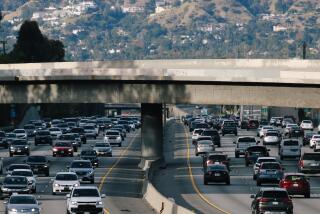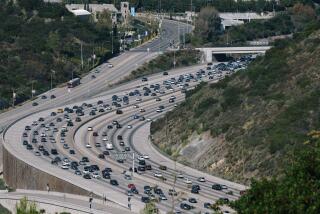Is there a fix on in car repair?
- Share via
The Automobile Club of Southern California fired a manager in its collision repair section and began an internal investigation into the matter three weeks ago, another sign of the controversy that has enveloped the insurance industry’s directed repair programs.
If you have ever had your prized car or truck smashed on the highway, you probably know that your insurance company will entice you to select one of its preferred auto body shops, saying that your repairs will be done more quickly and they will be guaranteed. The Auto Club and most auto insurers have so-called direct repair programs, which encourage policyholders to select an approved repair shop.
But these “directed repair programs” have become the target of allegations within the auto body industry that shops are being forced to perform substandard repairs and that some insurers are strong-arming shop owners with “pay to play” demands.
The evidence so far shows that at least some insurance company officials are demanding kickbacks to direct work, said Alan Wood, executive director of the Collision Repair Assn. of California, a trade group representing 75 shops.
“Some of the dirty little secrets are beginning to come out,” Wood said. “There is a huge amount of money at issue here. This type of business practice creates a very unfair climate for shop owners.”
Indeed, interviews with independent body shop owners indicate a widespread belief that they are being shaken down by aggressive insurers and their employees. These directed repair programs have succeeded in directing the majority of policyholders with damage claims to preselected garages.
If it is true that body shops are paying kickbacks to get such business, then the general public is ultimately footing the bill in the form of higher premiums for those improper payments.
Todd Bishop, owner of Dibbles Auto Body in Santa Rosa, is fighting back. He has successfully sued insurers in small claims court three times just this year and has files prepared for 20 additional suits, he said. Next year, he is scheduled to go to trial against insurance giant Geico in federal court, alleging that it is illegally steering customers away from his shop.
“We all thought direct repair programs were a good idea at first,” Bishop said. “We thought we could save insurers money by performing better repairs more quickly. But this greed factor entered in, and insurers are driving up their profits. They have adopted this policy that if a car is more than a year old, it is free game to cut every single corner.”
Wood said that in many cases, insurers refuse to pay prevailing labor rates and set caps on the maximum amounts for certain services, such as painting over collision damage. In some cases, paint is subject to a $300 limit, far below the actual cost of the materials needed for repairs.
Under state law, insurers can not force a policyholder to use a specific repair shop. That means that most car owners have greater freedom of choice in auto body repairs than they have in choosing doctors, if they have healthcare insurance. But the practical reality of that freedom is something else.
Body shop owners say that insurers do everything they can to discourage policyholders from going outside their network. Repairs that should take a couple of weeks end up taking months, because the insurer requires that adjusters make repeated trips to inspect vehicles, approvals for repairs are held up and payments are slow.
Bishop’s comments were echoed by other body shop owners and experts, who said they could not speak for the record because they feared repercussions from the insurance industry.
The Auto Club strongly defends its program, known as the immediate repair program, saying it gives its policyholders confidence that a shop meets the club’s standards for equipment and training, said spokeswoman Carol Thorp. What’s more, the club requires that original equipment parts are used.
The club has about 200 shops in its program in Southern California, giving its customers lots of choices.
L. Douglas Brown, a Century City attorney representing the owners of Autocraft of Torrance, one of the garages in the Auto Club repair program, said he has filed complaints alleging that Auto Club unit manager Gil Palmer took gratuities from an employee of the shop in exchange for referrals. He said the complaints were filed with the California Department of Insurance and Torrance police.
“This is a wide-ranging issue that affects not only AAA but many insurance companies,” Brown said. “This is the tip of the iceberg.”
In recent weeks, the club fired Palmer, Thorp told The Times, though it declined to say why. “We are conducting an internal investigation,” Thorp said. “If we are contacted by authorities, we will cooperate.” Palmer could not be reached for comment.
--







